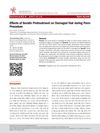 34 citations,
August 2003 in “Clinical and Experimental Dermatology”
34 citations,
August 2003 in “Clinical and Experimental Dermatology” Pregnant women's hair gets thicker.
 16 citations,
July 2002 in “Australasian Journal of Dermatology”
16 citations,
July 2002 in “Australasian Journal of Dermatology” A woman with lupus experienced skin death due to a blood clotting disorder after stopping a blood thinner, which healed with treatment.
63 citations,
November 2012 in “Journal of Cellular Biochemistry” Runx1 affects hair growth, cancer development, and autoimmune diseases in epithelial tissues.
 73 citations,
March 2010 in “Food and Chemical Toxicology”
73 citations,
March 2010 in “Food and Chemical Toxicology” Zizyphus jujuba essential oil can promote hair growth.
 10 citations,
July 2002 in “Australasian Journal of Dermatology”
10 citations,
July 2002 in “Australasian Journal of Dermatology” Careful management of blood thinners is crucial for lupus patients with APS.
 July 2002 in “Australasian Journal of Dermatology”
July 2002 in “Australasian Journal of Dermatology” Maintaining anticoagulation is crucial for patients with antiphospholipid syndrome.
 87 citations,
March 2005 in “Journal of Dermatological Science”
87 citations,
March 2005 in “Journal of Dermatological Science” Asiasari radix extract promotes hair growth and increases protein synthesis and cell proliferation.
 36 citations,
November 2009 in “Journal of Investigative Dermatology”
36 citations,
November 2009 in “Journal of Investigative Dermatology” Prolactin may affect hair growth differently based on gender and scalp area.
8 citations,
July 2020 in “Clinical, cosmetic and investigational dermatology” Excessive sun protection might cause frontal fibrosing alopecia by disrupting skin immune balance.
 1 citations,
July 2020 in “Journal of Biomedical Translational Research”
1 citations,
July 2020 in “Journal of Biomedical Translational Research” Raccoon dogs can adapt well to life with three legs after forelimb amputation.
 June 2023 in “Trichology and cosmetology:”
June 2023 in “Trichology and cosmetology:” Ageratum Conyzoides, when taken orally, can effectively reduce hair loss and improve hair growth.
 24 citations,
August 2017 in “Prostaglandins & Other Lipid Mediators”
24 citations,
August 2017 in “Prostaglandins & Other Lipid Mediators” CRTH2 antagonists might be useful for treating many conditions because they play a role in immune and inflammation responses.
 75 citations,
October 2002 in “Journal of Dermatological Science”
75 citations,
October 2002 in “Journal of Dermatological Science” Sophora flavescens extract may help hair grow by affecting growth factors and blocking a hair-related enzyme.

Stem cells regenerate tissues and their behavior varies by environment, suggesting the hematopoietic system model may need revision.
 18 citations,
December 1996 in “Seminars in Cutaneous Medicine and Surgery”
18 citations,
December 1996 in “Seminars in Cutaneous Medicine and Surgery” Chemotherapy and cytokine therapy can cause various skin reactions, including hair loss and hypersensitivity.
 24 citations,
July 2013 in “Oncologist”
24 citations,
July 2013 in “Oncologist” Bendamustine combined with rituximab is an effective and well-tolerated treatment for certain types of lymphoma.
 February 2022 in “Research Square (Research Square)”
February 2022 in “Research Square (Research Square)” High TSPEAR levels in colorectal cancer predict worse outcomes.
 March 2023 in “Asian journal of beauty & cosmetology”
March 2023 in “Asian journal of beauty & cosmetology” Keratin pretreatment improves the quality of damaged hair during perming.
 8 citations,
January 1989 in “Journal of Dermatological Treatment”
8 citations,
January 1989 in “Journal of Dermatological Treatment” This text talks about how to treat hair loss in women. It suggests different options and stresses the importance of support.
7 citations,
May 2014 in “Iranian Red Crescent medical journal” Laser hair removal is effective for hirsutism when combined with treatment for the underlying causes.
82 citations,
July 2012 in “Brain pathology” High LGR5 levels in glioblastoma indicate poor prognosis and are essential for cancer stem cell survival.
3 citations,
July 2023 in “Biomolecules” B2m-free HLA variants may be a new class of HLA important in immune responses and diseases.
 6 citations,
May 2021 in “JAMA network open”
6 citations,
May 2021 in “JAMA network open” Babies who gain weight quickly, especially in the first 3 months, may start puberty earlier.
 14 citations,
February 2023 in “Frontiers in immunology”
14 citations,
February 2023 in “Frontiers in immunology” Immune checkpoint inhibitors can cause skin issues but are linked to better cancer outcomes.
 1 citations,
February 2023 in “Daehan ui'sa hyeobhoeji/Daehan uisa hyeopoeji”
1 citations,
February 2023 in “Daehan ui'sa hyeobhoeji/Daehan uisa hyeopoeji” Primary healthcare clinics are key in managing chemotherapy side effects using various medications and treatments.
 23 citations,
October 2006 in “Journal of Investigative Dermatology”
23 citations,
October 2006 in “Journal of Investigative Dermatology” Men with baldness have higher levels of specific proteins, suggesting local hormone production may play a role in hair loss.
 155 citations,
August 1991 in “Journal of The American Academy of Dermatology”
155 citations,
August 1991 in “Journal of The American Academy of Dermatology” Methotrexate treats various disorders by inhibiting DNA synthesis, but careful monitoring is needed to avoid toxicity and manage side effects.
 25 citations,
July 1991 in “International Journal of Dermatology”
25 citations,
July 1991 in “International Journal of Dermatology” Toxic Epidermal Necrolysis is a rare, serious skin condition that can affect anyone, is more common in women, and may be linked to genetics, with a 20% mortality rate mainly due to sepsis.
 41 citations,
September 1991 in “Medical hypotheses”
41 citations,
September 1991 in “Medical hypotheses” Prolactin may be important for skin growth and immune function.

Baricitinib is a new, effective treatment for advanced alopecia areata but is costly and has risks.

























